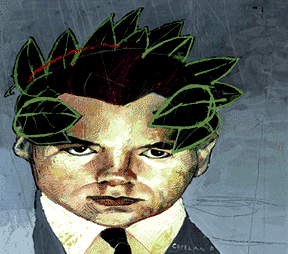
ILLUSTRATION BY JOHN COPELAND
Call for papers:
The pervasiveness of the
Gothic in postmodern literature and culture
suggests that this category has surpassed temporal and generic
boundaries, originating the proliferation of new subgenres and creating
new hybrids. In keeping
with this invasive effect, the seminar sets out to explore the complex
variety of the Gothic spectrum, from 18th-century Gothic to postmodern
Gothic mutations, including a whole range of new subgenres such as
"postcolonial Gothic",
"queer Gothic", "urban Gothic" and "comic Gothic", with a view to
establishing
the narrative strategies as well as the aesthetic, cultural and
ideological
implications of such Gothic productions.
My abstract:
The violent and abjectal writings of Bret Easton Ellis have not been properly understood. His novels have variously been read as chauvinist and sadist, or as blank, urban fictions depicting soulless, fetishist consumers, but relatively little attention has been given to how Ellis inscribes himself in an American Gothic tradition. Ellis’ use of Gothic narrative features to create an atmosphere of tension and unease, and playful intertextual references to create humour, in fact invites a reading of Ellis as a satirist, or parodist. While Ellis is no doubt imbricated in the commodification and reification of human relations he describes in his fictions, one must also grant him an implied author position from which he critiques his own Zeitgeist. Ultimately Ellis is a puritan, using Juvenalian satire to lampoon violence, fetishism and consumerism. My paper aims to illustrate this via Ellis’ most maligned and misunderstood publication, the 1994 suite of short stories, The Informers.
Read full paper: Bret
Easton Ellis’s The Informers as
Postmodern
Gothic and Juvenalian/Menippean Satire